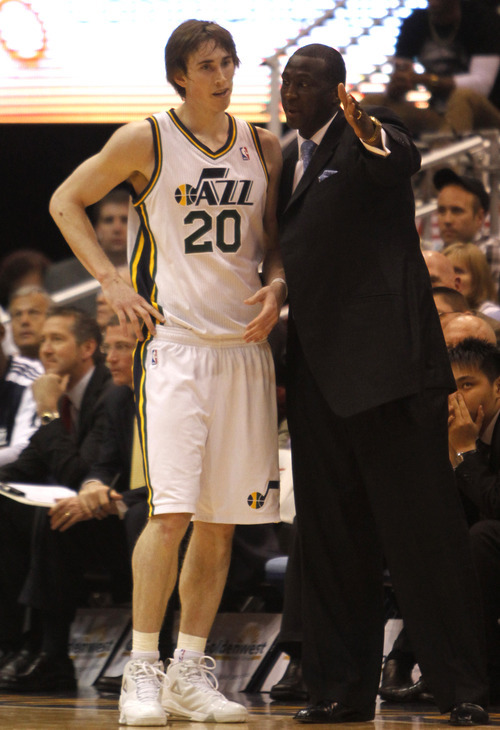This is an archived article that was published on sltrib.com in 2011, and information in the article may be outdated. It is provided only for personal research purposes and may not be reprinted.
First-year Jazz coach Tyrone Corbin has made two major decisions since taking over mid-season for Jerry Sloan. Neither went off smoothly, while both increased tension within a frustrated Utah team that is just 5-16 under Corbin, and was already dealing with the unexpected departures of Sloan and All-Star guard Deron Williams.
Corbin's first change seemed innocent at the time. Swapping C.J. Miles for Raja Bell in Utah's starting lineup March 14 against Philadelphia, Corbin made a move that Sloan had long resisted but made sense post-Williams. The Jazz's offensive space was shrinking, with opponents caving in on big men Al Jefferson and Paul Millsap after Williams' 3-point capability and ballhandling skills had been shipped to New Jersey; Miles' perimeter-based shooting opened the floor up.
The only problem? Bell left a morning shootaround for the 76ers game thinking that he was starting, despite Corbin having already told the media that Miles was being promoted — an announcement that was made while an unknowing Bell received medical treatment. The veteran then entered the arena later that evening still believing he was in the first unit, only learning about his demotion as tipoff approached.
Bell, a widely respected veteran whom his teammates have referred to as the "glue" of their now-fractured club, did not take the news well, telling the media that the communication between him and Corbin could have been better.
That temporary fissure was a prelude to the break between Jefferson and Corbin on Monday, during a 100-95 overtime home loss to Washington. And it followed an OT loss to New Orleans last Thursday, which saw Corbin acknowledge that he made a coaching mistake by not having Millsap intentionally miss the second of two free throws as Utah led 104-103 with just 1.3 seconds remaining in the fourth quarter.
Corbin and Jefferson suited up for the Wizards contest having said the same thing for the last two weeks: The Jazz would continue to fight, be professional and produce their best effort, despite the fact that Utah was playing its way out of a postseason berth. Corbin refused to panic, go young and rebuild. Meanwhile, Jefferson entered Utah's current six-game slide having played his best basketball of the year, at times single-handedly carrying his short-handed team on the offensive end and putting up All-Star-caliber numbers that shadowed his defensive deficiencies.
But after Utah scored an abysmal 30 points during the second half of a home loss Saturday to Dallas, the Jazz initially came out just as flat against Washington. Down 51-43 at halftime to the third-worst team in the NBA, Corbin suddenly decided to make the move that he had long resisted, hitting the rebuild button and putting rookies Gordon Hayward, Jeremy Evans and Derrick Favors on the court.
"I don't think we came out with the energy ready to take care of business," said Corbin, whose team did not practice Tuesday.
Jefferson was sent to the bench with 54 seconds left during the third quarter, never to return. Not when Utah was down by just three points with 2:14 left in regulation. Not when starters Earl Watson and Millsap were reinserted with 3:05 remaining in overtime, and the Jazz's rookies were tiring and losing their edge. Utah's leading scorer and rebounder — the only player on the Jazz's roster to start all 75 games this season — was completely isolated from his squad, at one point sitting three seats removed from his nearest teammate.
The message was clear: The Jazz were rebuilding, and Monday's hastily formed plan did not include Jefferson.
Asked two specific questions during a postgame interview about Big Al's benching, Corbin answered both but never specifically addressed the core of either. He explained why he decided to bring back Watson and Millsap, but Utah's coach failed to provide a reason for Jefferson's extended absence.
Jefferson walked out the arena without saying a word, but Miles acknowledged that his teammate was highly frustrated. And a series of recent no comments from Jefferson point toward a deepening fallout on a team where even personal communication has recently been a struggle. —
Playoff elimination number
2 • The combination of Jazz losses or Memphis wins during the next seven games that will eliminate Utah from the playoffs. The eighth-place Grizzlies hold a five-game lead over 11th-place Utah and also possess a tiebreaker.
—
Tough road
The Jazz must pick up five victories in their next seven games to prevent this season's team from becoming just the second club in the franchise's last 29 years to finish with a worse than .500 record.



